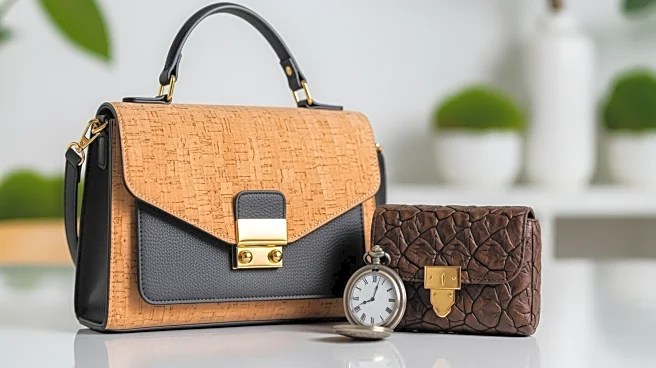What's Happening?
Recent research conducted by PwC reveals a significant shift in consumer behavior towards secondhand and sustainable luxury purchases, particularly among younger generations. The study, presented at a retail conference in Rome, surveyed 268 consumers
across Italy, Germany, the UK, France, and Spain, focusing on baby boomers, Gen X, millennials, and Gen Z. Findings indicate that 40% of Gen Z and 28% of millennials have engaged in buying secondhand products, while older generations show resistance to this trend. The research also highlights a growing preference for luxury items purchased from Italian multi-brand boutiques, with clothing being the most popular category. Gen Z and millennials are driving the demand for sustainable, accessible, and customizable luxury products, pushing the industry towards more inclusive and digital models.
Why It's Important?
The shift towards secondhand and sustainable luxury purchases reflects broader changes in consumer priorities, emphasizing environmental consciousness and value-driven spending. This trend is significant for the luxury fashion industry, which must adapt to meet the demands of informed and discerning younger consumers. Companies are encouraged to invest in experiences, circularity, and trust to build long-term value. The growing interest in sustainable and customizable products presents opportunities for brands to innovate and reposition themselves in the market. As younger generations redefine luxury, businesses that embrace these changes stand to gain a competitive edge, while those resistant to adaptation may face challenges in maintaining relevance.
What's Next?
Luxury brands are likely to continue evolving their strategies to cater to the preferences of younger consumers, focusing on sustainability and personalization. The industry may see increased investment in digital platforms and omnichannel experiences to enhance customer engagement. As Gen Z and millennials prioritize environmental impact and product customization, brands may explore collaborations with sustainable designers and expand their offerings in secondhand and rental markets. The ongoing transformation in consumer behavior could lead to a reevaluation of traditional luxury values, with exclusivity and craftsmanship remaining important but complemented by new priorities such as sustainability and digital integration.
Beyond the Headlines
The shift towards secondhand and sustainable luxury purchases may have broader implications for cultural and ethical norms within the fashion industry. As consumers become more aware of the environmental impact of their purchases, brands may face pressure to improve transparency and ethical practices. This could lead to increased scrutiny of supply chains and production methods, encouraging companies to adopt more sustainable practices. The emphasis on personalization and digital experiences may also drive innovation in technology, influencing how luxury brands interact with consumers and deliver value. The evolving landscape presents opportunities for brands to redefine luxury in a way that aligns with contemporary values and expectations.
















